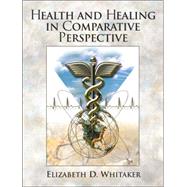
Note: Supplemental materials are not guaranteed with Rental or Used book purchases.
Purchase Benefits
Looking to rent a book? Rent Health and Healing in Comparative Perspective [ISBN: 9780131273832] for the semester, quarter, and short term or search our site for other textbooks by Whitaker; Elizabeth D.. Renting a textbook can save you up to 90% from the cost of buying.
| Preface | |
| Healers and Healing Traditions | |
| Introduction | |
| Backing into the Future | |
| Menopause: Lessons from Anthropology Healing Traditions | |
| Why not Call Modern Medicine ldquo;Alternativerdquo;? | |
| Concepts of Arthritis in Indiarsquo;s Medical Traditions: Ayurvedic and Unani Perspectives | |
| Cultural Studies of Biomedicine: an Agenda for Research | |
| Good Homeopathic Medicine in the City of Oaxaca, Mexico: Patientsrsquo; Perspectives and Observations | |
| The Epistemology of Traditional Healing Systems Patients and Healers | |
| Perturbing the System: ldquo;Hard Science,rdquo; ldquo;Soft Science,rdquo; and Social Science, the Anxiety and Madness of Method | |
| Clown Doctors: Shaman Healers of Western Medicine | |
| Shamanism and its Discontents | |
| Distal Nursing | |
| Witnessing and the Medical Gaze: How Medical Students Learn to See at a Free Clinic for the Homeless | |
| Biocultural Approaches Adaptation, Variation, Plasticity | |
| Living at the Edge of Space | |
| The Co-Evolution of People, Plants, and Parasites: Biological and Cultural Adaptations to Malaria | |
| The Vital Role of the Skin in Human Natural History | |
| Why Genes Donrsquo;t Count (for Racial Differences in Health) Evolutionary Medicine | |
| Evolution and the Origins of Disease | |
| Evolutionary Health Promotion | |
| Evolutionary Health Promotion: a Consideration of Common Counterarguments Prehistory and History of Human Health | |
| Emerging and Re-Emerging Infectious Diseases: the Third Epidemiologic Transition | |
| Health Conditions before Columbus: Paleopathology of Native North Americans | |
| A Comparison of Health Complaints of Settled and Nomadic Turkana Men | |
| The Resurgence of Disease: Social and Historical Perspectives on the ldquo;Newrdquo; Tuberculosis | |
| Implications of Pandemic Influenza for Bioterrorism Response Ecology and Geography of Disease | |
| Health Implications of Modern Agricultural Transformations: Malaria and Pellagra in Italy | |
| Global Climate Change and Emerging Infectious Diseases | |
| Ecology and Ethnomedicine: Exploring Links between Current Environmental Crisis and Indigenous Medical Practices | |
| Culture-Oriented Approaches Concepts and Perspectives | |
| Cultural Meaning, Explanations of Illness, and the Development of Comparative Frameworks | |
| The Mindful Body: a Prolegomenon to Future Work in Medical Anthropology Mind-Body-Universe | |
| Breast Cancer: Reading the Omens | |
| Refugee Stress and Folk Belief: Hmong Sudden Deaths | |
| Deconstructing the Placebo Effect and Finding the Meaning Response | |
| Possible Efficacy of a Creek Folk Medicine through Skin Absorption: an Object Lesson in Ethnopharmacology Explanatory Models and Social and Politico-Economic Contexts | |
| Cultural Contexts of Ebola in Northern Uganda | |
| Health Beliefs and Folk Models of Diabetes in British Bangladeshis: a Qualitative Study | |
| Social Scientists and the New Tuberculosis | |
| Embodiment of Terror: Gendered Violence in Peacetime and Wartime in Croatia a | |
| Table of Contents provided by Publisher. All Rights Reserved. |
The New copy of this book will include any supplemental materials advertised. Please check the title of the book to determine if it should include any access cards, study guides, lab manuals, CDs, etc.
The Used, Rental and eBook copies of this book are not guaranteed to include any supplemental materials. Typically, only the book itself is included. This is true even if the title states it includes any access cards, study guides, lab manuals, CDs, etc.